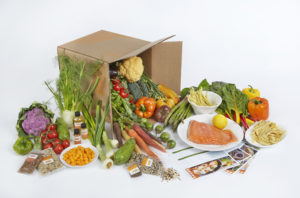Over the last decade, a food innovation community has been established in Boston’s greater startup and tech ecosystem. Think of ezCater, which was founded in 2007 and is now a nationwide marketplace for corporate catering. Think of Toast, which raised a total of $134 million for its restaurant point of sale and management system. Think of our very own Drizly, aka “Amazon for liquor,” which started when two Boston College students were curious why they couldn’t get beer delivered via app.

But the story doesn’t end here – it only starts. In Boston, food tech startups now have the resources to be established and, well, nourished, as Alan Salomone, food tech investor and co-founder of The Food Loft, explained.
Ten years ago, the majority of innovations tended to be incubated in one of Boston’s universities and then “move Westworld” to California, as Salomone said. Now, the migration has slowed down significantly, because colleges and universities not only foster innovation, but really foster innovation around food.
Babson College’s Food Sol, which supports food entrepreneurs, is one example, but there are countless other food tech startups coming in and out of the Harvard Innovation Labs or Northeastern University. Students are always hungry, after all; it’s one of the reasons why campus-born food delivery apps (like Boston University-born Stoovy Snacks) can compete with giant of food delivery like GrubHub.
“Boston is creating a great ecosystem not only for food innovation, but for support to food innovation.”
But there’s another piece of the puzzle that contributes to a thriving Boston food tech. “Boston is creating a great ecosystem not only for food innovation, but for support to food innovation,” Salomone said, citing organizations like Boston Public Market and The Food Loft itself. Local VC firms investing in food innovation, like Seaport-based Edible Ventures and three-year-old LaunchByte, are also part of the picture.
Local
In-depth news coverage of the Greater Boston Area.
To help readers navigate this landscape, BostInno has compiled a list of 10 early-stage food tech companies you need to know right now. Consider it your Boston food innovation menu.
(Full disclosure: The Food Loft is one of the backers of Jobletics, one of the startups included in this list; in addition, BostInno will host a food and tech SOI event at The Food Loft on April 19).
ChefDazzer
ChefDazzer is an iOS app that allows customers to book the services of local chefs for private events at their homes, like parties, cooking classes or regular weeknight dinners. “We wanted to create a unique dining experience as an alternative to going out to dinner, ordering meal kits or ordering take out,” Michael Cormier, CEO and co-founder (with Avery Gordon) of ChefDazzer, said. Chefs will also bring ingredients to prepare the requested meals and, depending on what customers want, can also bring equipment. Launched in February 2018, the South Boston-based company has a network of eight pre-screened chefs (with 50 more in waitlist) serving the greater Boston area and, upon request, New Hampshire. Pricing can vary, but it falls in the ballpark of $50/$75 per person. Currently, the company is bootstrapping and won’t disclose revenue information. Fun fact: the name of the company is related to Cormier’s nickname, “Daz.”
Cheffer
Started in September 2017, Cheffer is an online kitchen gadget rental service. Rentals include professional, relatively large or expensive equipment like circulators, KitchenAid mixers, smoking guns and automatic home brewing machines. Before receiving rentals, the company said customers will be provided with “unique recipes created by our top chefs.” Founder Lina Mamut, a former head of product at software company bowmo, wrote on Facebook that she’s currently working on launching a prototype of Cheffer in Boston, with the goal of expanding to other major cities in 2018 “and ultimately nationwide.”
Food for All
Food for All is an app aimed at reducing food waste by allowing users to buy (at discounted prices) excess food that restaurants didn’t sell. With its app now available in Boston and New York City, the startup began as a graduation project while CEO and founder David Rodriguez was completing his MBA at Hult International Business School in Cambridge. After developing its concept in collaboration with Harvard T.H Chan School of Public Health, the company was born in October 2016 and raised more than $50,000 in a Kickstarter campaign.
ForkOut

Founded by developer Lida Tang and combat veteran Caleb Singer, ForkOut is a five-people company based in the CIC co-working space in Kendall Square. In December 2017, the team launched a free app that aims to simplify the experience of coordinating a night out at a restaurant with a group of friends. Basically, imagine ForkOut as a combination of Yelp, Messenger, Google Maps and Uber: the app gathers the services of messaging with friends, reading reviews of restaurants and showing different means of transportation to get to the location on time. To date, the company announced partnerships with five Boston restaurants featuring exclusive deals for ForkOut users. “In the future, we expect to work with restaurants to provide them with additional paid services,” the company said on its website.
Jobletics
Started in early 2016, Somerville-based Jobletics is developing an automated platform that connects restaurant managers to a network of over 800 local workers (known as “Jobletes”), so the first can ensure that all their shifts are covered and the latter can choose where and when they want to work. In an interview with BostInno, CEO Rahul Sharma said that the early definition of the company as “the Uber for the food service hospitality” is not accurate anymore: “It can do a good job at painting the picture, initially [..]. We want to make sure that [our workers] are empowered to be successful when they go out and do work, we have on-boarding materials, knowledge-based materials. We want our workers to really gain skills.” The company is currently raising its seed round with SeedInvest, an equity crowdfunding platform.
Just Add Cooking

Launched in 2013 and headquartered in the South End, Just Add Cooking is local meal kit service that provides the ingredients (selected from local markets, with the exception of salt, pepper and oil) to realize a customer’s pre-approved recipe. The price depends on the size of the boxes, but it ranges from $6.95 to $11.50 per person with no additional fees. Individuals can customize their subscription plans by buying a boxes for two people or a family, from twice to five-time at week. The company said it has hundreds of recipes, from American to Italian and Mexican food. Asked about how the company differentiates itself from BlueApron, CEO Jan Leife said: “We source ingredients locally, meaning we have fresher ingredients… and a more sustainable and eco-friendly model, and less waste.” Leife added that the company has an ongoing seed round seeking $1 million, and it secured a $500,000 investment from an undisclosed angel group. In the future, the company wants to launch its meal kits on the retail market.
Nomsly

Co-founders Christopher Buck and Andrew Macaulay, both former employees at Digital Lumens, have changed the mission of their food and tech startup Nomsly. Born as a food delivery service of healthy lunches for children, the company currently provides five companies with snacks for their employees. “Making a transition was hard, because we invested a lot of time, and energy, and effort into our original market,” Buck said. “When the market tells you that there’s something else that you could be doing that’s better… you have to go that way.” Buck said that they noticed that a good percentage of their early customers were ordering kids’ lunch as snacks for themselves. Moreover, around December last year, video company Wistia – which later became the first customer of Nomsly 2.0 – asked Buck and Macaulay to provide snacks for employees five times a week. Nomsly, which is still based out of CommonWealth Kitchen in Dorchester, currently has three employees, plus contractors.
Spyce
Four recent mechanical engineering graduates at MIT invented Spyce, a fully-automated kitchen that can prepare dishes (or “bowls”) with no help from human cooks. In other words: Kale Rogers, Michael Farid, Braden Knight and Luke Schlueter invented a robotic kitchen. As The New Yorker reported, they built the prototype in the basement of their fraternity, Delta Upsilon, “using microcontrollers, inexpensive oven hoods, household power strips, and plastic trash bins, and attaching an air-conditioner to keep ingredients cool.” In early May, the company will open a fast-casual restaurant with a robotic kitchen at 241 Washington Street in Downtown Crossing (chef Daniel Boulud is collaborating on the project). Spyce raised a total of $3.8 million, according to Crunchbase, and it’s backed, among others, by Rough Draft Ventures. Also, the company was the recipient of a $10,000 prize as 2016 Lemelson-MIT “Eat it!” Undergraduate Team Winner.
Squadle
Squadle is developing Internet of Things-powered software applications to better manage multi-unit restaurant operations. In August last year, BostInno reported that Boston-based restaurant chain Chicken & Rice Guys improved the prevention of food safety incidents by using the company’s wireless temperature management system for its coolers and Squadle’s digital checklist software to automate the compliance process. The company aims to digitize many of restaurants’ back-of-house operations, including all the daily paperwork that has to be done on things like employee shifts, amount of cash in the bank and temperature logs. Founded in 2013, the Cambridge-based startup has raised about $1.2 million, and it’s backed by 500 Startups, Bolt, Accomplice and Walnut Ventures.
Squadle Is Using the Internet of Things to Help Prevent Food Safety Incidents
The Dinner Daily
Based in Westford, Mass., The Dinner Daily creates a weekly, five-day, personalized dinner menu and shopping list for users based on their specific dietary needs, where they buy ingredients, and the promotion specials for the week at local shops. The self-funded company was launched in 2014 by Laurin Mills, a mother of three, while she was working as a CPA for Ernst and Young in Boston. In March, the company announced a partnership with Peapod, so Dinner Daily subscribers can order their recommended groceries directly from the Illinois-based delivery service. “Our goal is to become that mainstream service that everyone will use,” Mills said in a recent interview with BostInno.



